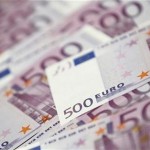The euro managed to distance from earlier lows against the US dollar on Tuesday, but gains seemed to remain capped, as weak inflation data, released out of Germany today, still weighed on demand for the common currency.
Having fallen to as low as 1.3359 at 9:35 GMT, EUR/USD reached a session high at 1.3446 at 14:04 GMT, after which consolidation followed at 1.3437, gaining 0.23% for the day. Support was likely to be received at November 8th low and also a seven-week low, 1.3343, while resistance was to be met at November 3rd high, 1.3496.
The common currency has been under selling pressure since last Thursday, when the European Central Bank, at its meeting on policy, decided to reduce borrowing costs by 0.25% to a new record low level of 0.25%. The central bank also maintained its deposit rate at zero and pared the marginal lending rate to 0.75%. The odds increased that the bank may consider using unconventional tools such as quantitative easing or a negative deposit rate, in case consumer prices in the Euro region continue slowing down or the economic recovery remains frail.
Todays data also added to concerns that inflation in the Euro zone may continue to stall. The annualized final index of consumer prices (CPI) in Germany slowed down to 1.2% in October, marking the lowest level in three years, as a month ago the index stood at 1.4%. Nation’s annual CPI, evaluated in accordance with the harmonized methodology, also decelerated in October, reaching 1.2%. This data may certainly restrain the upside movement of the euro.
Another explanation for the recent daily advance of the euro against the pound, the yen and the US dollar may probably be the increased risk appetite of market participants due to the lack of crucial economic reports scheduled for release later on Tuesday.
In addition, earlier on Tuesday, Ewald Nowotny, a member of European Central Banks Governing board, said that Euro zone countries might be facing another problem beside inflation – a prolonged period of stagnation. This statement came, following ECBs interest rate decision last week, a move criticized by several countries, including Germany. According to Nowotny, the reduction of borrowing costs should be examined from a wider perspective – as a measure, facilitating the increase in disposable income of individuals, especially those with low income.
Meanwhile, the euro was gaining against the pound, with EUR/GBP cross up 0.66% on a daily basis to trade at 0.8442 at 15:13 GMT. EUR/JPY pair was advancing 0.71% to trade at 133.91 at 15:15 GMT.





